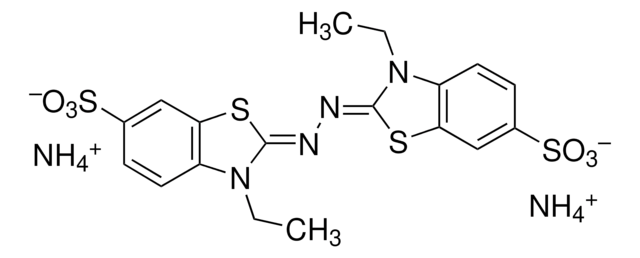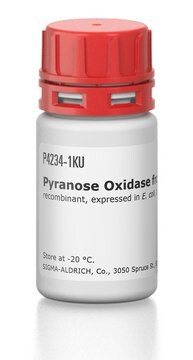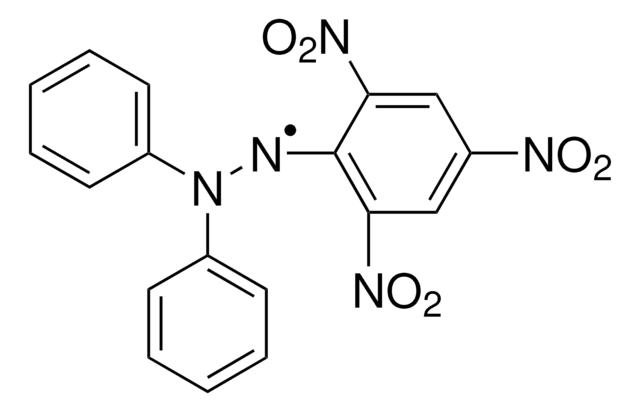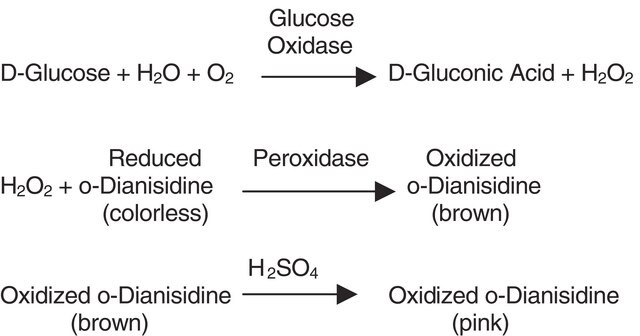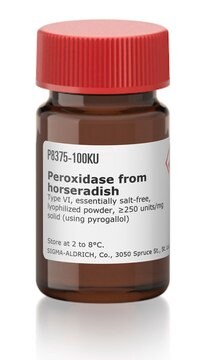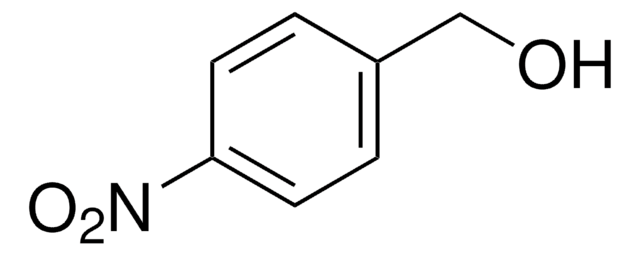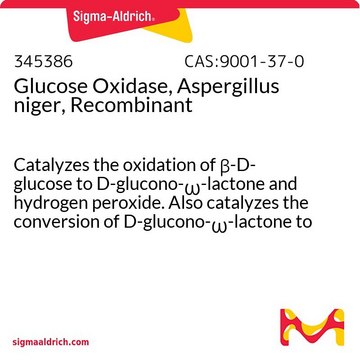P8279
Protocatechuate 3,4-Dioxygenase from Pseudomonas sp.
lyophilized powder, ≥3 units/mg solid
Autenticatiper visualizzare i prezzi riservati alla tua organizzazione & contrattuali
About This Item
Numero CAS:
Numero MDL:
Codice UNSPSC:
12352204
NACRES:
NA.54
Prodotti consigliati
Origine biologica
bacterial (Pseudomonas spp.)
Livello qualitativo
Forma fisica
lyophilized powder
Attività specifica
≥3 units/mg solid
PM
~700 kDa
Condizioni di spedizione
dry ice
Temperatura di conservazione
−20°C
Descrizione generale
Protocatechuate 3,4-Dioxygenase belongs to the non-heme iron family of enzymes. The active site of the enzyme contains Fe3+.
Applicazioni
Protocatechuate 3,4-Dioxygenase(PCD), from Pseudomonas sp., is used for the enzymatic determination of choline esterase when coupled with phydroxybenzoate hydroxylase. It is used to improve organic fluorophore-stability in single-molecule experiments and is used to study the metabolism of protocatechuate in Rhizobiaceae.
The enzyme has been used to create an oxygen scavenging system along with protocatechuate (PCA) and Trolox. The enzyme employs a nonheme iron center that catalyzes the conversion of PCA and molecular oxygen into β-carboxy-cis,cis-muconic acid, while the antioxidant Trolox suppresses slow blinking and photobleaching of cyanine dyes. It has been used in the preparation of imaging buffer along with DMB-BSA (dynein motility buffer-BSA), ATP and protocatechuate in single molecule motility assay.
Azioni biochim/fisiol
Protocatechuate 3,4-Dioxygenase catalyzes the degradation of 3,4-dihydroxybenzoate (protocatechuate) into β-carboxy-cis,cis-muconate.
Proprietà fisiche
Structure : Protein with nonheme iron
Inhibitors : Ag+, Hg++, PCMB
Optimum pH : 9.0
Optimum temperature : 60−65°C
pH Stability : pH 7.0−9.0 (25°C, 72hr)
Thermal stability : below 50°C (pH 6.0, 1hr)
Inhibitors : Ag+, Hg++, PCMB
Optimum pH : 9.0
Optimum temperature : 60−65°C
pH Stability : pH 7.0−9.0 (25°C, 72hr)
Thermal stability : below 50°C (pH 6.0, 1hr)
Definizione di unità
One unit will oxidize 1.0 μmole of protocatechuate to 3-carboxy-cis,cis-muconate per min at pH 7.5 at 37 °C.
Stato fisico
Supplied as lyophilized powder.
Risultati analitici
Protein determined by biuret.
Inibitore
N° Catalogo
Descrizione
Determinazione del prezzo
Codice della classe di stoccaggio
11 - Combustible Solids
Classe di pericolosità dell'acqua (WGK)
WGK 3
Punto d’infiammabilità (°F)
Not applicable
Punto d’infiammabilità (°C)
Not applicable
Dispositivi di protezione individuale
Eyeshields, Gloves, type N95 (US)
Certificati d'analisi (COA)
Cerca il Certificati d'analisi (COA) digitando il numero di lotto/batch corrispondente. I numeri di lotto o di batch sono stampati sull'etichetta dei prodotti dopo la parola ‘Lotto’ o ‘Batch’.
Possiedi già questo prodotto?
I documenti relativi ai prodotti acquistati recentemente sono disponibili nell’Archivio dei documenti.
I clienti hanno visto anche
Mindy I Davis et al.
Journal of the American Chemical Society, 124(4), 602-614 (2002-01-24)
The geometric and electronic structure of the high-spin ferric active site of protocatechuate 3,4-dioxygenase (3,4-PCD) has been examined by absorption (Abs), circular dichroism (CD), magnetic CD (MCD), and variable-temperature-variable-field (VTVH) MCD spectroscopies. Density functional (DFT) and INDO/S-CI molecular orbital calculations
A Buchan et al.
Applied and environmental microbiology, 67(12), 5801-5809 (2001-11-28)
Degradation of lignin-related aromatic compounds is an important ecological process in the highly productive salt marshes of the southeastern United States, yet little is known about the mediating organisms or their catabolic pathways. Here we report the diversity of a
Colin Echeverría Aitken et al.
Biophysical journal, 94(5), 1826-1835 (2007-10-09)
The application of single-molecule fluorescence techniques to complex biological systems places demands on the performance of single fluorophores. We present an enzymatic oxygen scavenging system for improved dye stability in single-molecule experiments. We compared the previously described protocatechuic acid/protocatechuate-3,4-dioxygenase system
Resonance Raman studies on protocatechuate 3, 4-dioxygenase inhibitor complexes
Que J L and Epstein R M
Biochemistry, 20(9), 2545-2549 (1981)
Brevibacterium fuscum protocatechuate 3, 4-dioxygenase. Purification, crystallization, and characterization.
Whittaker J W, et al.
The Journal of Biological Chemistry, 259(7), 4466-4475 (1984)
Il team dei nostri ricercatori vanta grande esperienza in tutte le aree della ricerca quali Life Science, scienza dei materiali, sintesi chimica, cromatografia, discipline analitiche, ecc..
Contatta l'Assistenza Tecnica.

